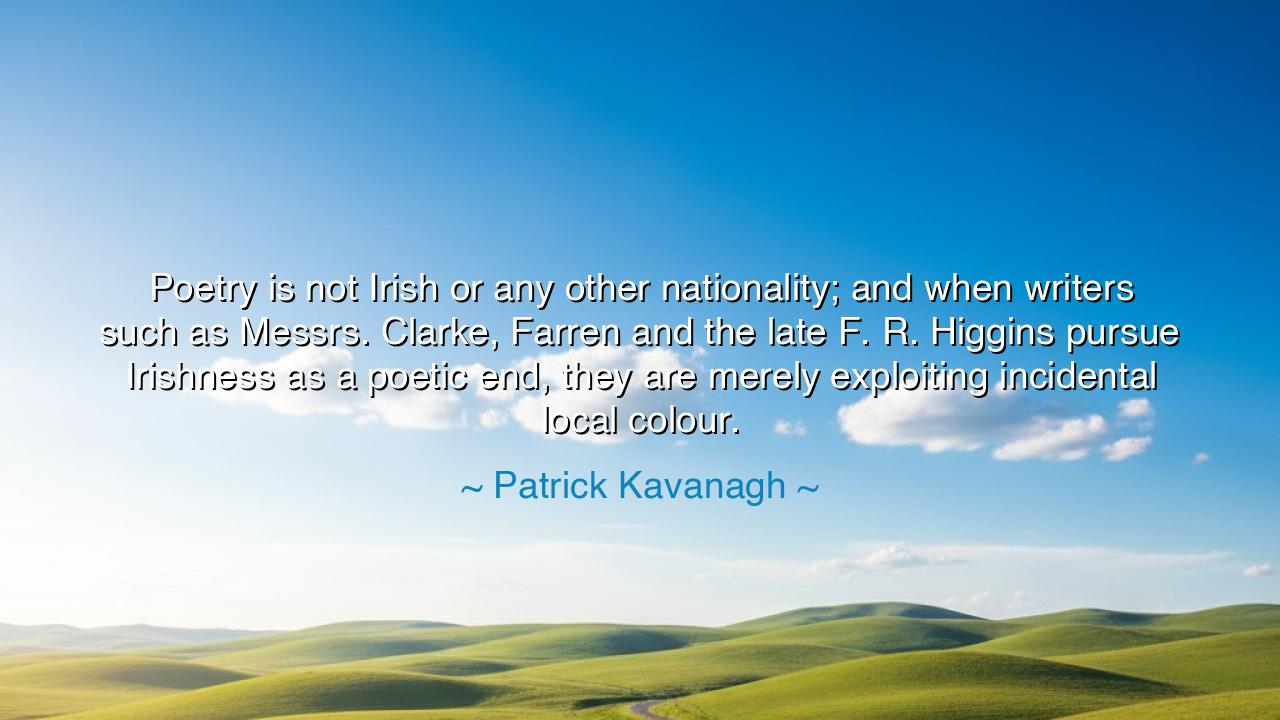
Poetry is not Irish or any other nationality; and when writers
Poetry is not Irish or any other nationality; and when writers such as Messrs. Clarke, Farren and the late F. R. Higgins pursue Irishness as a poetic end, they are merely exploiting incidental local colour.






Hear the uncompromising voice of Patrick Kavanagh, farmer-poet of Monaghan, who declared: “Poetry is not Irish or any other nationality; and when writers such as Messrs. Clarke, Farren and the late F. R. Higgins pursue Irishness as a poetic end, they are merely exploiting incidental local colour.” In this fiery pronouncement, Kavanagh shatters the illusion that poetry is bound by borders, that its greatness lies in waving the banner of a nation. To him, poetry was not a servant of patriotism nor a costume of identity—it was eternal, unchained, born of the universal heart of man. To reduce it to “Irishness” or “Englishness” was to mistake the husk for the seed, the garment for the soul.
The meaning of his words is sharp and liberating. Kavanagh warns against the trap of turning art into propaganda, of mistaking local symbols for eternal truth. National identity may give a poet material—landscapes, dialects, traditions—but these are only colours upon the surface. If pursued as an end in themselves, they become shallow, ornamental, incapable of touching the deeper human spirit. A poem that lives only by “Irishness” or “Frenchness” is no longer poetry, but commentary. True poetry transcends place, reaching the universals of suffering, love, death, beauty, and longing.
The ancients knew this truth well. Homer wrote of Greeks and Trojans, yet who today reads him only for his “Greekness”? His poetry endures because it reveals the nature of wrath, grief, loyalty, and the brevity of life—truths that are not Hellenic only, but human. Similarly, Dante filled his Divine Comedy with Florentine politics and names, but its force lies not in Tuscan quarrels, but in its cosmic vision of sin, redemption, and love. Kavanagh, in his blunt way, reminds us that true poetry rises above local colour, speaking in the voice of humanity itself.
History gives us another witness in Rabindranath Tagore, who wrote in Bengali yet spoke to the world. His poetry was steeped in Indian landscapes, rhythms, and traditions, but he did not bind himself to “Indianness” as a poetic end. Instead, he sought the eternal truths of the soul. This is why his verses were loved across continents and why he became the first non-European to win the Nobel Prize in Literature. The local may give poetry flavour, but it is the universal that gives it immortality.
Kavanagh himself lived this lesson. Though rooted in the fields of Monaghan, he despised the false romanticism of “peasant poetry” that sought only to decorate Irishness. In his own works, such as The Great Hunger, he stripped away sentimental nationalism and revealed the deeper anguish of loneliness, toil, and the yearning for meaning. His Ireland was not a postcard but a mirror to the universal condition of humanity. Thus, his greatness lies not in writing about Ireland, but in writing about life, using Ireland as the vessel.
The lesson for us is stern yet vital: do not confine art to nationalism, identity, or surface symbols. Let your roots nourish you, but do not mistake them for the whole tree. If you write, do not ask, “How can this be more Irish, or more American, or more French?” Ask instead, “How can this be more true, more human, more eternal?” For art that clings to surface will wither with time, but art that touches the universal will endure across generations and nations.
Practical is this path: when you read poetry, look beyond the surface of national or cultural signs—seek the eternal truths they carry. When you create, use the colours of your own soil, but paint with them the portrait of the human spirit, which knows no borders. For as Kavanagh teaches, poetry is not Irish, nor English, nor of any nation—it is the eternal language of the soul. And to write in this language is to join the chorus of all ages, all peoples, all hearts.






PNPham Ngoc
I understand Kavanagh’s frustration with the commodification of Irishness in poetry, but I wonder if focusing on ‘Irishness’ is truly the same as exploiting local color. Could it be that these poets are simply attempting to capture the essence of their culture as part of their larger artistic exploration? Can the personal and cultural dimensions of poetry be separated, or do they inherently inform one another?
TS32.Nguyen The Son
Kavanagh’s critique of poets who focus on national identity as a poetic end seems to suggest that poetry should be about something deeper, beyond mere cultural symbols. But can national identity be avoided in poetry? Doesn’t a poet’s background inevitably influence their perspective? How do we reconcile the desire to write universal poetry with the fact that our identities—cultural, national, personal—always shape how we express ourselves?
NHNguyen Huong
I find Kavanagh's perspective interesting, as it challenges the idea that a poet’s national identity should shape their work. But can a writer ignore their cultural context entirely? Isn’t culture something that shapes how we see the world, and shouldn’t that inevitably influence the poetry we create? Is it possible to write poetry that is universal, or are we always bound by the experiences that define us?
NVNgoc Vy
Kavanagh’s assertion that poetry is not tied to nationality makes me reflect on how we often try to define and limit art by cultural boundaries. Is it possible that by focusing too much on ‘Irishness’ or any other specific identity, we miss the broader, universal appeal of poetry? Can a truly great poet transcend nationalities, or does every piece of writing inevitably carry the essence of its cultural origins?